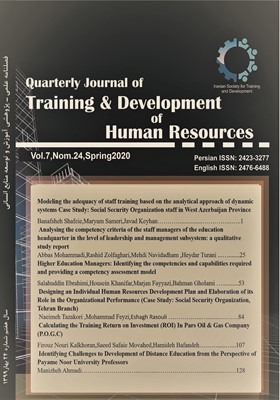-
-
List of Articles
-
Open Access Article
1 - Designing an Individual Human Resources Development Plan and Elaboration of its Role in the Organizational Performance (Case Study: Social Security Organization, Tehran Branch)
Naeimeh Tazakori Mohammad Feizi Mohammad Rouhi Eisalou Eshagh Rasouli -
Open Access Article
2 - Calculating the Training Return on Investment (ROI) In Pars Oil & Gas Company (P.O.G.C)
Frouz Nouri Saeid Safaee Movahed Hamideh Bafandeh -
Open Access Article
3 - Modeling the adequacy of staff training based on the analytical approach of dynamic systems Case Study: Social Security Organization staff in West Azerbaijan Province
Banafshe Shafei Maryam Sameri Javad Keyhan -
Open Access Article
4 - Identifying Challenges to Development of Distance Education from the Perspective of Payame Noor University Professors
Manijeh Ahmadi -
Open Access Article
5 - Higher Education Managers: Identifying the competencies and capabilities required and providing a competency assessment model
Hossein Khanifar Salahedin Ebrahimi Bahman Gholami Marjan Fayyazi -
Open Access Article
6 - Analysing the competency criteria of the staff managers of the education headquarter in the level of leadership and management subsystem: a qualitative study report
عباس محمدی Rashid Zolfaghari zaferani Heidar Tourani Mehdi Navidadehm
-
The rights to this website are owned by the Raimag Press Management System.
Copyright © 2017-2026







